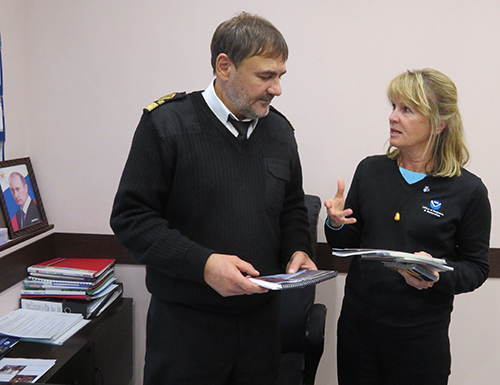Seminar on Understanding Maritime Pollution Threats and Response Systems in the Russian Federation-United States Trans-Boundary Area
NOVEMBER 16, 2018 — On November 3-10, Doug Helton and Catherine Berg from the OR&R's Emergency Response Division traveled with colleagues from the U.S. Coast Guard and the State of Alaska, to Yuzhno-Sakhalinsk, Russia to participate in a "Seminar on Understanding Maritime Pollution Threats and Response Systems in the Russian Federation-United States Trans-Boundary Area".

The seminar involved a number of Russian agencies, industry, and NGOs, including the Russian Marine Rescue Service, the World Wildlife Fund, the Nevelskoy Maritime University, the State Oceanographic Institute, Sovcomflot (a Russian maritime shipping company specializing in petroleum and LNG shipping), Sakhalin Environmental Watch, Rosneft, and Exxon Neftegas.
Discussions focused on three main areas: trans-boundary pollution threats, national preparedness and response capabilities, and methods for joint responses to incidents in the boundary area.
The meetings concluded with an international tabletop exercise to test and practice the provisions of the existing "Joint Contingency Plan of the United States of America and the Russian Federation on Combating Pollution in the Bering and Chukchi Seas."
The goals of the exercise included testing emergency international notifications and the use of ERMA (Environmental Response Management Application) as a common operational picture to facilitate the coordination of emergency response efforts.
For more information, contact Doug.Helton@noaa.gov or Catherine.Berg@noaa.gov.
Go back to the OR&R Weekly.
